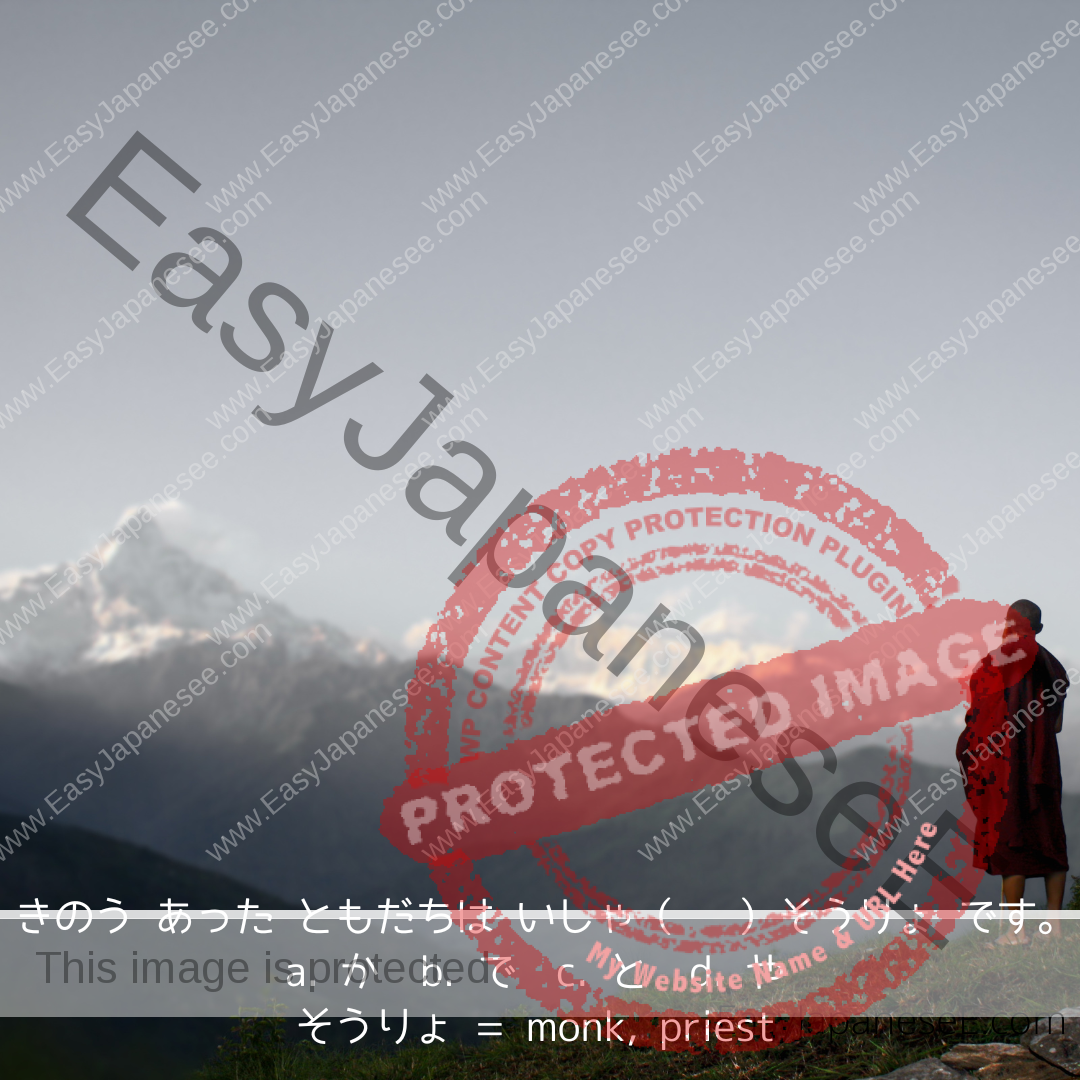I wrote the following post soon after I created this website but I now feel compelled to rewrite it.
The other day one of my students wrote this sentence: ちちはシェフとレストランのオーナーです. As usual, I said to her that she can’t say that because “と” can connect only 2 nouns.
Then the student said to me, “chef” and “owner” are both nouns! Umm, she is right! she got me!!
Still, you can’t say ちちはシェフとレストランのオーナーです。You must say ちちはシェフで、レストランのオーナーです。(or more commonly, ちちはシェフで、レストランをけいえいしています。)
Why?
I think that is because, you are connecting two “ideas,” not two “items” or “things.”
Probably the reasoning is similar as when you say “He is an engineer and owner of a company” in English, NOT “He is an engineer and an owner of a company.”
Learning a language is always full of discoveries!
Today’s Question
You can use all a. か b. で c. と and d. や in the blank below but can you tell how the meanings change? (hint: how many friends did I see yesterday?)
きのう あった ともだちは いしゃ( )そうりょ です。
a. か b. で c. と d. や
a. か
か here is the same as the English “or”, so きのう あった ともだちは いしゃか そうりょ です means “My friends I saw yesterday are either a medical doctor or a monk.” (It is unlikely that I don’t know if my FRIEND is a medical doctor or a monk.) Probably the meaning will become clearer if I add みんな/all in the sentence like: きのう あった ともだちは みんな いしゃか そうりょ です。: All my friends I saw yesterday are either a medical doctor or a monk.
It’s likely that I saw more than 2 friends and they are either a medical doctor or a monk.
b. で
で can be a particle for a location, a reason/cause or condition/status but いしゃ can’t be any of those, so in this case, this で is the てform of the auxiliary verb です/だ.
てform combines sentences (or predicates) with “and”, so きのう あった ともだちは いしゃで そうりょ です means “the friend I saw yesterday is a doctor and he is a monk,” i.e. he is a medical doctor and monk.
In this case, I saw only one friend yesterday and he is a medical doctor and monk.
Just in case you are wondering, I’d say this combination is not that unusual in Japan. When somebody is born to a parent who is a monk/priest looking after a temple, he/she is expected to take over the temple when the parent retires, so they get ordained as a monk/priest while they pursue their own career.
c. と
と has many meanings but when と is used between 2 nouns, that is for the “exclusive and” i.e. AとB is “A and B but nothing else” but you cannot use と when talking about 2 or more roles of the same person/item.
きのう あった ともだちは いしゃと そうりょ です means: I saw 2 friends, one a medical doctor and the other a monk.
d. や
や also has many meanings but when it is used between 2 nouns, that is for the “inclusive and” i.e. AやB is “A and B and so on.”
きのう あった ともだちは いしゃや そうりょ です means I saw more than 2 friends and that they included a medical doctor and a monk and others who were not a medical doctor or a monk.
Going back to シェフ and レストランのオーナー
The gist of the story is: if you are talking about more than one role of one person, you need to use で instead of と unless you think of a different way of conveying the same message.
In case of being シェフ and レストランのオーナー, it is easy because there is a convenient word: オーナーシェフ. オーナーシェフ is a chef who runs the restaurant where he/she works.
兼
Although it is either JLPT N2 or N1 level, another way of talking about 2 or more roles of a person or an item can be using 兼.
わたしは日本語教師兼翻訳士です。
I am a Japanese teacher and translator.このへやは書斎兼応接間です。
This is a room used both as a study and for receiving visitors.


I think you can also say “ちちはレストランのチェフとオーナーです。”// my dad is the chef and owner of the restaurant.// my dad is the restaurant’s chef and owner.
Thank you for the comment. Your comment prompted me to re-write the post. Please read the revised version.